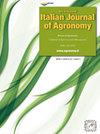叶面施用植物性生物刺激剂可提高加工番茄的产量和品质
IF 2.1
3区 农林科学
Q1 AGRONOMY
引用次数: 10
摘要
番茄是一种广泛分布于世界各地的蔬菜。通常为了提高产量和质量而施用大量肥料,而不考虑对环境的负面影响。降低这种风险的一个可能的视角是通过使用植物生物刺激剂来提高氮利用效率,同时提高产量和质量。本研究的目的是验证三种基于植物的生物刺激剂对加工番茄作物的农艺、质量和氮利用效率的潜在有益影响。该实验提供了三种生物刺激剂(褐藻提取物[SwE]、豆类水解蛋白[LDPH]和热带植物提取物)。进行了以下评估:可销售和不可销售的产量、平均果实重量、硬度、pH、总可溶性固形物(TSS)、颜色参数(a/b)、亲水抗氧化活性(HAA)、亲脂性抗氧化活性(LAA)、总抗坏血酸含量(AsA)、酚类总含量、硝酸盐和总氮含量、氮利用效率、氮吸收效率和氮利用率。叶面施用生物刺激剂,特别是蛋白水解物和海藻提取物,显著影响了可销售产量,比对照平均增加18.3%,不可销售产量平均减少41.3%。氮利用和氮吸收效率遵循相似的趋势,生物刺激剂使其高于对照,分别为+18.4%和+59.3%;施氮植株果实中氮含量也较高:比对照高+2.3%。这一发现也反映了处理植物果实中更高的干物质积累和硬度(分别比对照增加10.9%和+114.1%)。生物刺激剂的应用,特别是SwE和LDPH,也提高了TSS(+12.8%)、a/b色比(+7.5%)、HAA和AsA(分别为9.8%和114.6%)。因此,豆类蛋白水解物和褐藻Ecklonia maxima提取物似乎是提高罐头工业番茄产量和质量的一种良好的可持续方法。本文章由计算机程序翻译,如有差异,请以英文原文为准。
Foliar application of plant-based biostimulants improve yield and upgrade qualitative characteristics of processing tomato
Tomato (Solanum lycopersicum L.) is a diffused worldwide vegetable. Great amounts of fertilizers are often applied for increasing yield and quality, without considering the negative effect on the environment. A possible perspective for reducing this risk is to raise the nitrogen use efficiency (NUE) through the use of plant biostimulants, which also improve yield and quality concomitantly. The aim of the current study was to verify the potential beneficial effect of three vegetal-based biostimulants on agronomical, qualitative and nitrogen use efficiency of a processing tomato crop. The experiment provided three biostimulants (an extract of brown seaweed [SwE], a legume-derived protein hydrolysate [LDPH] and a tropical plant extract). The following assessments were carried out: marketable and unmarketable yields, mean fruits weight, firmness, pH, total soluble solids (TSS), colour parameters (a/b), hydrophilic antioxidant activity (HAA), lipophilic antioxidant activity (LAA), total ascorbic acid content (AsA), total phenols, nitrate and total nitrogen content, nitrogen use efficiency, N-uptake efficiency, and N-utilization. The foliar application of biostimulants especially protein hydrolysates and seaweed extract significantly affected the marketable yield with an average increase of 18.3% over the control and 41.3% average decrease in unmarketable yield. The N-use and N-uptake efficiency followed a similar trend, with biostimulants boosting it higher than control, +18.4% and +59.3%, respectively; the nitrogen content was also higher in fruits of sprayed plants: +21.3% over control. This finding also reflects on higher dry matter accumulation and firmness in fruits of treated plants (+10.9% and +14.1% over control, respectively). The biostimulants application, in particular SwE and LDPH, also boosted TSS (+12.8%), the a/b colour ratio (+7.5%), HAA and AsA (9.8% and 114.6%, respectively). Therefore, the legume-derived protein hydrolysates and extract of brown seaweed Ecklonia maxima seem a good sustainable approach to improve yield and quality of tomato for canning industries.
求助全文
通过发布文献求助,成功后即可免费获取论文全文。
去求助
来源期刊

Italian Journal of Agronomy
AGRONOMY-
CiteScore
4.20
自引率
4.50%
发文量
25
审稿时长
10 weeks
期刊介绍:
The Italian Journal of Agronomy (IJA) is the official journal of the Italian Society for Agronomy. It publishes quarterly original articles and reviews reporting experimental and theoretical contributions to agronomy and crop science, with main emphasis on original articles from Italy and countries having similar agricultural conditions. The journal deals with all aspects of Agricultural and Environmental Sciences, the interactions between cropping systems and sustainable development. Multidisciplinary articles that bridge agronomy with ecology, environmental and social sciences are also welcome.
 求助内容:
求助内容: 应助结果提醒方式:
应助结果提醒方式:


